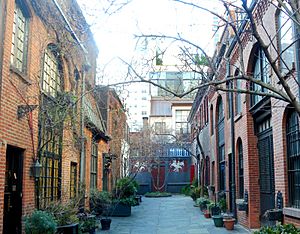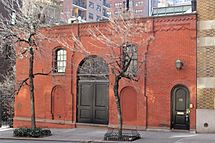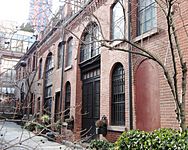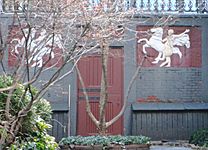Sniffen Court Historic District facts for kids
The Sniffen Court Historic District is a special historic area in New York City. It's one of the smallest historic districts in the city. It was officially made a historic place on June 21, 1966. The New York City Landmarks Preservation Commission made this decision.
Sniffen Court is a tiny, dead-end street. It's called a "mews," which is an old word for a small street with stables. The court was named after John Sniffen, who was a builder in the area. You can find it off East 36th Street in the Murray Hill neighborhood of Manhattan. It's located between Third and Lexington Avenues.
The district includes the entire alley. It has 10 two-story brick buildings. These buildings were originally stables for horses and carriages. They were built between 1863 and 1864. Their design is in an early style called Romanesque Revival.
|
Sniffen Court Historic District
|
|

(2012)
|
|
| Location | off East 36th Street between Third and Lexington Avenues Manhattan, New York City |
|---|---|
| Built | 1863-1864 |
| Built by | John Sniffen |
| Architectural style | Early Romanesque revial |
| NRHP reference No. | 73001224 |
Quick facts for kids Significant dates |
|
| Added to NRHP | November 28, 1973 |
Contents
From Stables to Homes and Studios
Over time, people didn't need carriage houses as much. So, the buildings in Sniffen Court were changed for other uses.
The Amateur Comedy Club
In 1918, two of the stables were bought. These were #1 (also known as 150 East 36th Street) and #3. The buyer was the Amateur Comedy Club. This club has been around since 1884. They turned the stables into their clubhouse and theater. They still use them for this purpose today.
Artists and Architects Live Here
In the 1920s, more buildings were converted. By 1966, one building was an architect's office. The building at #2 (156 East 36th Street) was home to a famous architect. The rest of the buildings became small private homes.
Famous Sculptors in the Court
Two well-known artists had studios in Sniffen Court. They were the sculptors Malvina Hoffman and Harriet Whitney Frishmuth. On the back wall of the alley, you can see two sculpted plaques. These plaques show Greek horsemen. Malvina Hoffman created these sculptures.
National Recognition
The Sniffen Court Historic District received more recognition later. On November 28, 1973, it was added to the National Register of Historic Places. This means it's considered an important historic site for the whole country.
Gallery
-
Sculpted plaques by Malvina Hoffman
See also
 In Spanish: Distrito histórico de Sniffen Court para niños
In Spanish: Distrito histórico de Sniffen Court para niños
 | Aaron Henry |
 | T. R. M. Howard |
 | Jesse Jackson |





